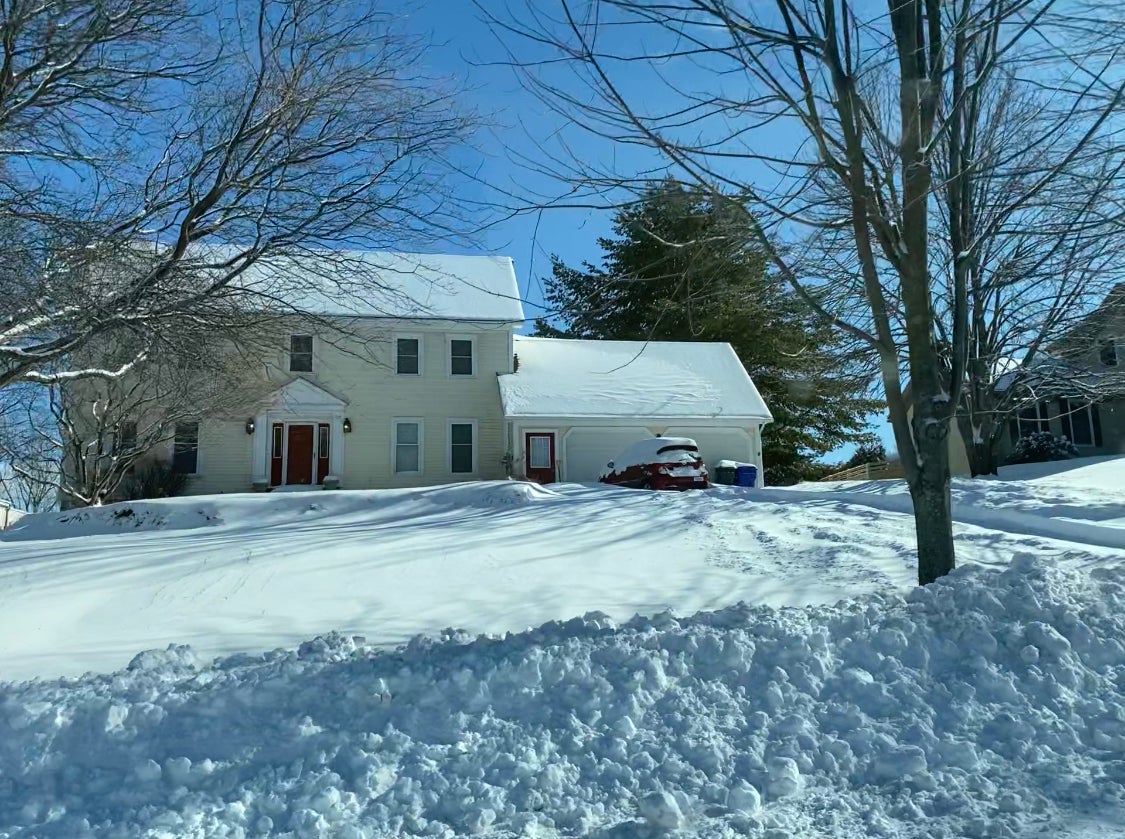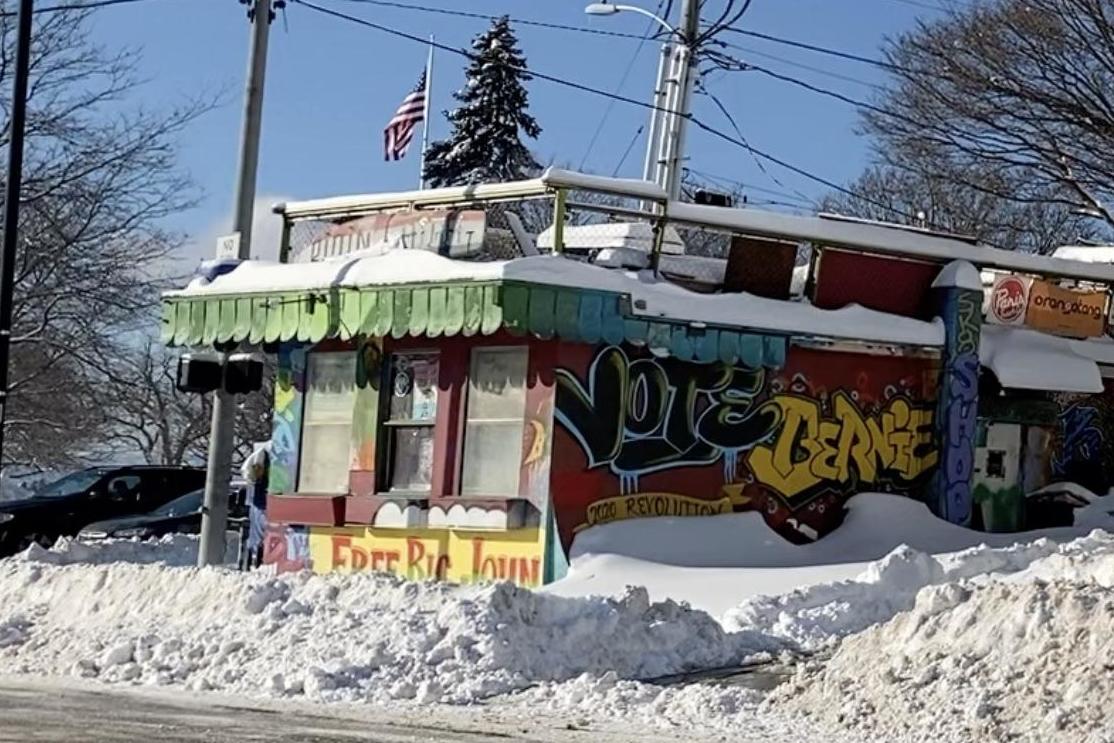In Burlington, Vermonters are used to seeing Sanders at the local store pushing his grocery cart. They’ve known him for decades. Now he may be president
Clark Mindock Burlington, Vermont @ClarkMindock
Late last week as Bernie Sanders and the top 2020 Democratic contenders campaigned in New Hampshire, a massive storm rolled through the northeast of the United States, dumping snow across the Green Mountains and pine trees of Vermont.
Outside the senator’s home in Burlington, an inches-thick blanket of snow covered his car, a bright red Chevy Bolt parked up against a garage door. The white “Bernie” bumper sticker was visible from the street.
In a city that has been shaped by Sanders over decades and which has adopted the Brooklyn-born politician as something of a local folk hero, the sticker is hardly a shock. The house itself is not particularly notable – not small but not a mansion either. It doesn’t have a modicum of the security one might expect to surround the potential future leader of the US, nor even a hedge out front.
“I’ve known him ever since he was mayor,” says Barry DeLaDuca, an 80-year-old who has lived in the neighbourhood since before Sanders moved in. “I think it’s interesting and nice and a good change. He hasn’t changed his viewpoints since I’ve known him.”
Is he a fun neighbour to have? “We kind of respect these people in our neighbourhood and in Vermont, too. We like to give them their space and let them be people along with whatever they’re trying to achieve. I see him, say 'Hello'. He’s polite, says 'Hello' back. He’s not – in my viewpoint – one of those with a gotta-go-out-and-shake-their-hand kind of attitude.”
The quiet could soon change, though, as could the security outside Sanders’ home if he marches closer to the Democratic nomination and the presidency. Among his neighbours who spent their Saturday morning with snow shovels in hand, that fairly new possibility conjures up a sense of pride, and an odd reckoning that the man they have seen pushing a cart at the Hannaford’s grocery store down the street may soon be the most powerful man in the world.

Sanders’ house after a heavy snow (Clark Mindock/The Independent
Sanders has had a good start to 2020. Since the launch of his campaign a year ago, he has made a consistently strong showing in the once-burgeoning Democratic field, and has won the popular vote of both states that have voted so far in the Democratic primaries and caucuses.
In Iowa, Sanders came out behind Pete Buttigieg in delegates but beat his rival and fellow former mayor (Sanders represented Burlington in the 1980s, while Buttigieg gave up his South Bend, Indiana, office earlier this year) by some 6,000 votes overall.
After both declared victory amid the meltdown of an app that Iowa's Democrats thought would streamline their voting process, Sanders went on to win the New Hampshire primary.
Back in Burlington, where Sanders launched his political career with a long-shot campaign for mayor that he won by just 10 votes, his neighbours say that he was a regular sight around town even as he became one of the best known politicians in the country.
He tips well when he stops by for takeaway, one observes, and says 'Hi' to his neighbours when he’s around. They insist that he is treated like anyone else in this community just 20 miles south of the US-Canada border, where car radios pick up French and country stations alike.
“He’s a good tipper, he’s always in a hurry, he’s always busy,” says David Beams, a bartender and restaurant worker who lives just a few houses down from him. “I think one thing about Burlington is that when you see celebrities around town or well-known people, I don’t think they behave any differently and nobody really bothers them. I’ve always appreciated that. He’s just another guy around here.”
Still, his name is on murals in town, and bumper stickers, and the 78-year-old senator is something of a draw for students at the University of Vermont, which is around 15 minutes from his home. He may be treated like anybody else, but he has certainly left his mark.
“Well, there’s diversity, but people are really proud that he was one of our neighbours. We talk about that a lot,” says Jim Palmer, a landscape architect and former professor who has lived in the neighbourhood across the street from Sanders for about eight years.
He continues: “We travel a fair amount and everybody’s always amazed when we tell them that he’s our neighbour.”

A grafitti-covered building near Sanders' home in Burlington (Clark Mindock/The Independent)
But the question remains: even in this liberal college-town that sways state elections, do people think he can win the the presidency in 2020?
And, if he does, will he have any chance of making good on his vision of social and economic equality that has made him a hero to young Democrats but has been rejected by other voters as an impractical fad?
“I thought his time had passed,” says Brian Neufeld, a middle-school science teacher, referring to the enthusiasm around Sanders' campaign in 2016 election and his eventual defeat in that race. “I see he’s garnered a lot of enthusiasm after Iowa. I’m excited about that for him. My entire investment is who can beat Trump, so I want to put my momentum behind the candidate that can unseat the incumbent.”
On that point, Neufeld has some reservations about the senator’s candidacy: “I’m not sure if the country’s ready for Bernie. I love his ideas, I’m just afraid that the moderate portion of our society sees him as too radical, and I’d hate to set him up for that failure.”
It is certainly a question that Democrats across the country have been wrestling with. While many seem to support some of Sanders’ most ambitious proposals – 77 per cent of Democrats support Medicare for All, for instance – others have expressed concern that he is a bit too radical compared with those promising more incremental change.
However, while Sanders’ run for president doesn’t necessarily have everyone’s support in Burlington – a Trump bumper sticker was spotted at a nearby police station – his consistency on policy dating back to the 1980s is often celebrated.
“Bernie has always been the guy that just runs by his own rules. He’s never let anything sort of influence him in one way or another. He has his track record that speaks for itself, really,” says Tim Sharbaugh, a medical worker who lives down the street from the senator. “He doesn’t let money influence his politics. He puts the human first and that’s what I really like about him, which is something that is pretty lost in politics these days.”
Nick Stephany, a solar-industry worker who works just outside of Burlington, is among those who isn’t really "feeling the Bern", but his hesitancy is rooted in the belief that Sanders is a better leader for Vermont in the Senate than the country as a whole.
“Bernie’s a good guy. I’ve either known him or known of him my entire life,” he says.
Stephany is among those who are suspicious of national politicians as a whole: “Any individual who seeks to be the president of the United States is immediately suspect in my eyes.”
In addition, he has concerns about what that national prominence could do to Sanders: “I’m worried if he gets elected, he gets brought into the room with the joint chiefs of staff and they say, ‘That was all good talk – this is how it works.’”
It’s a question that pulls at a thread that a Sanders presidency would almost surely unravel: can a political revolution for the working class at the expense of billionaires – and one that is contrary to the military-industrial complex, with its links to almost every community in the country – ever truly take root in the US?
For Stephany, that potential reality could be devastating: “That changes the Bernie, and we don’t want to change the Bernie.”
No comments:
Post a Comment